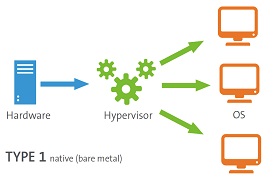
A hypervisor, also known as a Virtual Machine Monitor (VMM), is a critical component in virtualization technology, enabling the creation and management of virtual machines (VMs) on a physical host. The hypervisor acts as an intermediary layer between the hardware and the virtualized operating systems, allowing multiple operating systems to run concurrently on the same physical server. It allocates and manages the resources of the host system, including CPU, memory, and storage, among the virtual machines, ensuring efficient utilization of hardware resources.
There are two types of hypervisors:
Type 1: Bare-metal hypervisors
They run directly on the hardware without the need for a host operating system, providing better performance and resource utilization.
Type 2: Hosted hypervisors
They run on top of a host operating system and are commonly used for development and testing environments.
Hypervisors have become integral in server consolidation, cloud computing, and data center management, offering flexibility, scalability, and resource efficiency in managing virtualized environments.
The Scheme GCS, Group B for Hypervisor, is essential in the field of information technology, particularly in the realm of virtualization. This scheme establishes standardized specifications for the design and interoperability of hypervisors, which are software or hardware components that enable the creation and management of virtual machines on a single physical server. Compliance with Group B ensures that hypervisors consistently meet performance standards, facilitating the efficient and secure operation of virtualized environments. Adherence to this scheme supports the creation of a standardized and interoperable environment for hypervisors, ensuring their compatibility and reliability across various computing environments in the dynamic landscape of information technology. The GCS Scheme, Group B, is vital for advancing the overall efficiency and capabilities of hypervisors in the realm of virtualization.
Note: Manufacturers of hypervisors are required to obtain the mandatory TEC Certification to sell their products in the Indian market.
For manufacturers looking to introduce hypervisor solutions in India, obtaining TEC certification is a crucial regulatory requirement. TEC certification ensures that these virtualization solutions align with specific technical standards and regulations set by the Telecommunication Engineering Centre, a key authority in India overseeing norms for telecommunication equipment. This certification process is essential for validating the solutions' compliance with established criteria, covering aspects such as performance, compatibility, and cybersecurity within the Indian telecommunication landscape. By securing TEC certification, manufacturers not only underscore their commitment to regulatory compliance but also affirm the reliability and compatibility of their hypervisor solutions. This certification ensures seamless integration into the Indian technology landscape, setting a benchmark for quality and functionality. The mandatory certification promotes consumer confidence and secure deployment of these virtualization solutions across various applications in India.
TEC (Telecommunication Engineering Centre) Certification is a crucial accreditation granted by the Telecommunication Engineering Centre, which operates under the Department of Telecommunications, Government of India. TEC Certification ensures that telecommunications equipment complies with the specified technical standards and legal requirements, verifying their quality, safety, and interoperability. This certification is essential for manufacturers and importers seeking to market their telecommunications products in India. Established in 1987, TEC plays a vital role in formulating and enforcing standards to enhance the efficiency and reliability of telecommunication networks and services in the country. TEC Certification is a mark of adherence to these standards, facilitating market access and assuring consumers of the reliability and compliance of the certified products with Indian telecommunications norms.
Follow the given steps to complete your TEC certification process:
Step 1: Register on the TEC Portal
Step 2: Allotment of the testing laboratory
Step 3: Submit samples for testing
For more detailed information, please click here.
The list of documents required for TEC certification is as follows:
Legal Address Proof of the Manufacturing Unit:
Trademark Details:
Technical Details About Products:
For more detailed information, please click here.
Brand Liaison provides valuable support in obtaining the TEC Certificate for your products. Our services include:
For a more in-depth understanding of the documentation and procedures involved in obtaining TEC Certification, feel free to connect with our team of experts at +91-9250056788 or +91-8130856678.